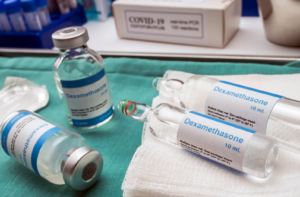
In one of the studies – termed the REMAP-CAP study – COVID-19 patients from 8 countries were observed. The patients were given different forms of treatment by physicians including different doses and administration routes of hydrocortisone. The researchers found that fixed-doses of hydrocortisone for 7 days as well as a shock-dependent dose of hydrocortisone were highly likely to benefit COVID-19 patients. The benefits included not only survival but also being free of cardiovascular support and ICU-based respiratory support within 3 weeks from when treatment began.
Another study was conducted in France on roughly 150 patients who were admitted to the ICU for respiratory failure that was COVID-related. About half of the group received an initial dose of 200 mg per day of hydrocortisone, which was lowered to 100 mg and then to 50 mg over up to 14 days, while the other half received a placebo. Though there did not appear to be a significant difference in the effects of the treatment versus placebo after 3 weeks, experts have suggested that the results may have been underpowered because the trial was terminated early.
The COALITION COVID-19 Brazil III trial involved nearly 300 COVID-19 patients with moderate or severe acute respiratory distress. Approximately half of these patients were given corticosteroids, while the rest of the patients were given corticosteroids as well as IV dexamethasone at a dose of 20 mg daily, which was lowered to 10 mg daily after 5 days for patients remaining in the ICU. The combination treatment led to more ventilator-free days after 28 days of treatment than the single corticosteroid treatment.
The final study – commonly referred to as the REACT study – involved a metaanalysis on how severely ill patients responded to systemic dexamethasone, methylprednisolone, hydrocortisone, and placebo (or usual care). When comparing the interventions, the scientists observed that corticosteroids were more effective in preventing deaths than placebo or normal care.
The combination of these studies on how corticosteroids affect COVID-19 patients appears to point to a role for these drugs in treating the virus. Ongoing research will help to clarify if and how these drugs can best be used to improve symptoms and save the lives of those infected with COVID-19.
References
Dequin, P.F. et al. (2020). Effect of hydrocortisone on 21-day mortality or respiratory support among critically ill patients with COVID-19. JAMA. doi:10.1001/jama.2020.16761
The WHO Rapid Evidence Appraisal for COVID-19 Therapies (REACT) Working Group (2020). Association between administration of systemic corticosteroids and mortality among critically ill patients with COVID-19. JAMA. doi:10.1001/jama.2020.17023
The Writing Committee for the REMAP-CAP Investigators. (2020). Effect of hydrocortisone on mortality and organ support in patients with severe COVID-19. JAMA. doi:10.1001/jama.2020.17022
Tomazini, B. et al. (2020). Effect of dexamethasone on days alive and ventilator-free in patients with moderate or severe acute respiratory distress syndrome and COVID-19. JAMA. doi:10.1001/jama.2020.17021
